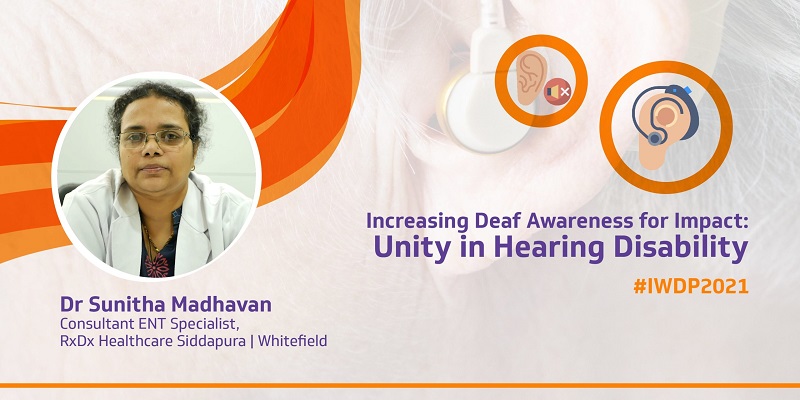The WHO predicts that nearly 2.5 billion people may have varying degrees of hearing loss by 2050. Among them, around 700 may require aural rehabilitation. At present, 5% of the global population already have the need for hearing rehab. Hearing loss can be mild or moderate or severe, and deafness is the profound loss of auditory capability.
Unity in Hearing Disability can only be achieved when armed with the right knowledge. In this blog, we are going to look at the causes and ways of improving the lives of people with hearing loss or impairment.
Causes of Deafness
Our auditory sense can be impaired due to various reasons.
- From birth (congenital). Congenital hearing impairment or hearing loss can be genetic or due to an in-utero infection
- Age-related hearing loss (presbycusis) acquired at a later part of life
- Auditory viral infections like measles, mumps, rubella, or any chronic bacterial infection of the ear, or even as a sequela of meningitis
- Injury to the ear like tear, scratches, or rupture from aaccidents or foreign objects, hematoma, fracture in middle ear bone
- Sensorineural hearing loss can be from prolonged exposure to loud noise
- Occupational Hearing Loss (OHL) can be from acoustic traumatic injury and loud noise-induced hearing loss (NIHL) or from an exposure to ototoxic chemicals at work
- Barotrauma (pressure difference) is injury to part of your body due to extreme change in barometric pressure, air or water. It happens when you are in very high or very low altitude, e.g., flying in an aeroplane, mountain climbing, scuba diving, and such other events
- Excessive use of ototoxic drugs. Some medicines can damage the ears leading to ringing in the ear, balance disorders, or even loss of hearing
- Cardiovascular diseases can influence the blood flow to the extremely sensitive inner ear, capable of causing irreversible damage
Improving quality of life
Learning to live with deafness and knowing how to deal with them can make a big difference in our quality of life. Identification. Treatment. Prevention. These are the three-prong approach to impede or avoid hearing impairments.
A few activities that can raise awareness on prevention of auditory disorders are as follows:
- Genetic counselling and educating pregnant women on TORCH infections which can affect the foetus. TORCH stands for toxoplasmosis, rubella cytomegalovirus, herpes simplex, and HIV. Awareness and advocating proper care are significant in preventing hearing issues at an early stage.
- Screening for hearing impairment as soon as hearing loss or impairment is suspected
- Educating how to protect the ear from loud noise especially in cases of factory workers, or those working in the aviation sector by using ear protective devices.
- Proper treatment of ear infection as early as possible.
- Screening for hearing impairment early, at new-born or school level. It’s very important to identify ear defects early, especially before speech and language development.
- Immunisation is crucial to prevent diseases like measles, mumps and rubella viral infections which can cause hearing loss.
- Audiological evaluation, speech therapy which includes teaching sign language and use of hearing aid.
- Cochlear implantation for those who meet the criteria according to the ENT specialist.
- Lifestyle modifications like reduction of weight, control of hypertension, blood sugar can help prevent acquired causes of hearing loss.
- Maintaining aural hygiene or ear health can prevent infections.
Occupational aid for those with hearing disability
Being deaf doesn’t have to be the end of the world. Many have successfully developed skills and become financially independent, accomplished their goals, and made a difference in their own lives and the community.
Financial aid can be arranged for hearing aids and cochlear implantation for those indicated are carried out. Sign language, speech therapy, use of hearing aids and other assistant devices are a major part of rehabilitation in the deaf population, economically, emotionally, socially.
Promoting artists and establishments run by hearing-impaired and enable them, in turn, to contribute to the wellbeing of the society. The families of those dealing with deafness can undergo training on sign language to be able to show their support.
The world belongs to those who are ready to own it. Let’s do our bit and offer our support to all who need it.
Written by Dr Sunitha Madhavan, Consultant ENT Surgeon (Otorhinolaryngologist), RxDx Healthcare
Edited by Ms Anindita Choudhury, Communication Specialist, RxDx Healthcare


